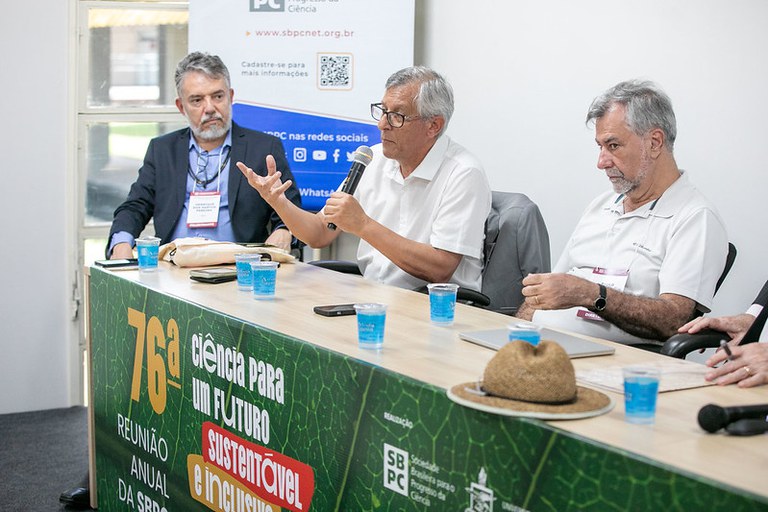The model of social organization of the research institutes of the Ministry of Science, Technology and Innovation (MCTI) was the subject of discussion during the 76th Annual Meeting of the Brazilian Society for the Advancement of Science (SBPC). This event takes place until Saturday (13), at the campus of the Federal University of Pará (UFPA), in Belém.
The roundtable was held on Thursday (11) coordinated by Ana Teresa Ribeiro de Vasconcelos (LNCC) with the participation of speakers Márcio Portes de Albuquerque (CBPF), Osvaldo Luiz Leal de Moraes, Interim Secretary of Strategic Policies and Programs (MCTI) and João Valsecchi do Amaral (Mamirauá) and Rui Albuquerque (CNPEM), in Building H – Exhibition Hall H1, on the campus.
MCTI consists of seven social organizations, 17 research units, two local authorities, two public companies and a foundation, with a total of 29 associated units. During the discussion, the advantages and disadvantages that guide social organizations and research units in the country today were discussed.
For the Director General of the Mamiraua Institute, new social arrangements and a broad listening to society are essential to create the operating system. “It is necessary to create a management plan. Include operating systems in the internal strategic discussion spaces of the Ministry, since operating systems are not just implementers. It is necessary to understand their role in the STI system, as well as to re-evaluate the legislative bills that govern the model.”
Concerned about the proposed changes to Law No. 9637, of May 15, 1998, by Senator Paulo Paim, CNPEM analyst Roy Albuquerque spoke about the importance of continuing the discussion in the chamber. “The senator’s proposal makes a reorganization that would only benefit the operating system in the health sector, rather than creating a new law. That would be a “jaboti,” as they call it in Congress,” he pointed out.
The above-mentioned law provides for the qualification of entities as social organizations, the establishment of the National Propaganda Program, the extinction of the aforementioned bodies and entities and the absorption of their activities by social organizations, among other things.
Representing the research units, Marcio Portes criticized the search for funding more than the implementation of projects. “The research units are positioned as sub-secretariats. Furthermore, we must follow the discussions taking place in the Ministry of Administration. He pointed out that CT&I must be a central area and occupy the stage it deserves.
There is no answer to the question of what is the best management model. In the discussion, Ana Teresa Ribeiro de Vasconcelos pointed out that the diversity of models is good for the system. “We want to provide good quality science to the Brazilian population,” the coordinator said.
For Osvaldo Moraes, Secretary of Strategic Policies and Programs at MCTI, “it is necessary to strengthen institutional structures.” He pointed to the ministry’s recent achievements in 2023, such as the fight against science denial, the announcement of a public competition to fill more than 800 vacant positions, and the exemption from the budget of the National Fund for the Development of Science and Technology (FNDCT). “We need to be practical. We need budgetary and human resources,” he concluded.

“Hardcore beer fanatic. Falls down a lot. Professional coffee fan. Music ninja.”






More Stories
The law allows children and adolescents to visit parents in the hospital.
Scientists pave the way for the emergence of a new element in the periodic table | World and Science
Can dengue cause hair loss? Expert explains how the disease affects hair